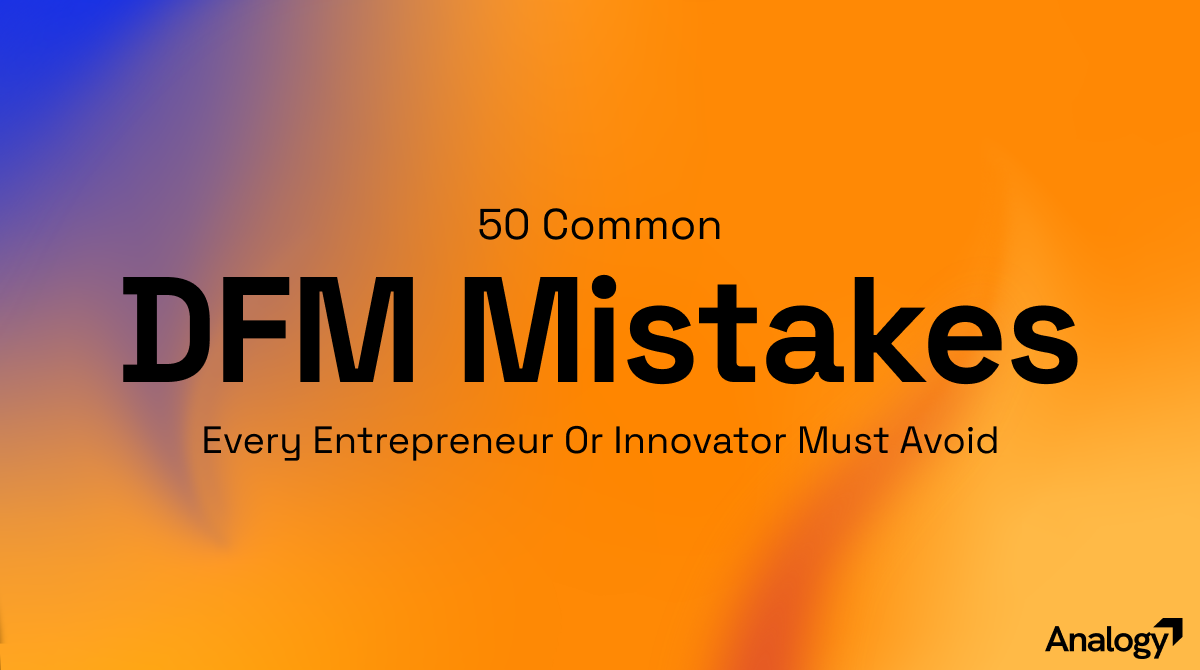
From "I have an idea for Invention" to Invention Success: the Independent Innovator's guide to selling ideas
Do you have a brilliant idea for a product that could change the world? But are you unsure how to take it from a spark of inspiration to a real product on store shelves?
The process of bringing an invention to life can be daunting, but it doesn't have to be. This blog will guide you through the essential steps involved, from validating your concept to navigating the complexities of manufacturing and sales. With the right knowledge and support, you can turn your innovative idea into a thriving business.
Going from having an idea for an invention to actually selling it
Embarking on the journey of innovation often begins with a burst of inspiration, but the path from concept to market can be daunting. It's common to feel exhilarated by a groundbreaking idea but unsure how to translate it into a viable product. This uncertainty can stall progress and dampen enthusiasm. However, understanding the steps involved in the invention process, such as prototyping, patenting, and marketing, is crucial. Seeking guidance from experts in product development and entrepreneurship can provide clarity and direction, helping you navigate the complexities of bringing your invention to market successfully.
Seeking inspiration for business product ideas to refine them into marketable products
Generating business product ideas is just the beginning; transforming them into profitable ventures requires strategic refinement. While creativity fuels initial concepts, market research and consumer feedback are essential for shaping ideas into products that meet real-world needs and preferences. Collaborating with industry professionals, conducting thorough market analyses, and leveraging innovative design and branding strategies can help refine your ideas into marketable products with the potential for success.
Navigating the complexities of bringing your product idea to life
Bringing a product idea to fruition involves navigating a myriad of challenges, from manufacturing and distribution to marketing and sales. Seeking assistance from experienced professionals can streamline this process, ensuring that your invention reaches its full potential in the market. Whether you need guidance on patenting and legal matters or support in identifying suitable sales channels and crafting effective marketing strategies, expert advice can be invaluable. By partnering with individuals or organizations knowledgeable in product development and entrepreneurship, you can overcome obstacles, maximize opportunities, and increase the likelihood of your invention's success in the marketplace.
1. Conducting a Thorough Patent Search
Before embarking on the journey of product development, it is imperative to ensure the originality of your invention through a comprehensive patent search. This step not only safeguards your intellectual property but also provides insights into existing solutions and potential areas for improvement. Utilizing methods such as keyword searches and patent databases enables inventors to identify prior art effectively. Additionally, brainstorming different terms and gaining a deep understanding of how the invention works can uncover valuable information. By conducting a diligent patent search, inventors lay the foundation for innovation while mitigating the risk of infringement claims.
2. Researching the Market
Understanding market dynamics is paramount for gauging demand and assessing competition. Utilizing resources such as retail stores, trade publications, and online platforms provides valuable insights into consumer preferences and emerging trends. By identifying unique selling points and potential sales opportunities, inventors can tailor their product to meet market needs effectively. Thorough market research forms the bedrock of informed decision-making, guiding product development and marketing strategies.

3. Prototyping and Protection
Prototyping serves as a crucial step in validating the feasibility and functionality of the product. By creating a simple prototype, inventors gain valuable feedback and insights for refinement. Simultaneously, filing for protection through methods like Provisional Patent Applications safeguards against intellectual property theft and secures legal rights. Prototyping and protection go hand in hand, ensuring that the innovation remains shielded while advancing through the development process.

4. Creating a Sell Sheet and Licensing
Crafting a compelling Sell Sheet is essential for capturing the attention of potential licensees and investors. This one-page document succinctly highlights the benefits and features of the product, serving as a persuasive tool in negotiations. Researching potential licensees and approaching them with professional pitches and product information enhances the likelihood of securing favorable licensing agreements. Effective communication and presentation skills play a pivotal role in showcasing the value proposition of the invention to prospective partners.

5. Turning Idea Into a Product
Transforming an idea into a tangible product requires a systematic approach that encompasses various stages of development. From conducting market research and patent checks to prototyping and seeking strategic partnerships, each step contributes to the realization of the vision. Creating comprehensive business and marketing plans enables inventors to chart a clear path towards commercialization while aligning with market demands and opportunities.

6. Seeking Partnerships and Financing
Collaborating with partners can accelerate product development and provide access to essential resources and expertise. Whether through strategic alliances with manufacturers or partnerships with investors, forging mutually beneficial relationships is crucial for scaling operations and accessing necessary financing. Developing robust business and marketing plans facilitates strategic decision-making and enhances the attractiveness of the venture to potential investors and partners.

7. Importance of Legal Guidance
Throughout the journey from ideation to commercialization, legal counsel plays a pivotal role in safeguarding intellectual property and navigating regulatory complexities. From conducting patent searches and filing for protection to negotiating licensing agreements, legal guidance ensures that inventors' rights are protected and interests are safeguarded. By partnering with experienced attorneys specializing in intellectual property law, inventors can navigate the intricacies of the legal landscape with confidence and clarity.

Treating the invention as a business endeavor requires a long-term perspective and unwavering commitment to success. Maintaining detailed records of the development process enables inventors to track progress and iterate effectively. Additionally, passion for the idea fuels perseverance in the face of challenges, driving innovation and creativity. Leveraging online marketing channels and cultivating word-of-mouth recommendations amplifies product visibility and fosters brand advocacy, paving the way for sustained growth and success.
In conclusion, the path from idea to success is marked by strategic planning, diligent execution, and unwavering perseverance. By following the outlined steps and leveraging the guidance of experts, inventors can navigate the complexities of product development and bring their innovations to market fruition. With a blend of innovation, resilience, and strategic foresight, the journey towards success becomes an exhilarating adventure filled with boundless opportunities. Taking an invention from concept to market requires a strategic approach and unwavering determination. This blog series has equipped you with the essential steps and valuable insights to navigate this exciting journey. Remember, with dedication, strategic planning, and the support of experts, you can turn your innovative idea into a successful product that makes a real impact.
FAQs
Conduct a comprehensive patent search to ensure your idea is original. Utilize keyword searches and patent databases to check for similar inventions and identify prior art. This process will help you safeguard your intellectual property and avoid potential infringement issues.
The first step is to validate your idea through market research. Identify if there is a demand for your product, understand your potential competition, and gather insights into consumer preferences and emerging trends. This ensures that your idea is marketable and has a chance for success.
A prototype allows you to test and validate your invention’s functionality and feasibility. It provides you with tangible insights and feedback, enabling you to refine your design. Additionally, a prototype is essential for protecting your idea through patents and attracting investors or licensees.
Protect your idea by filing for Provisional Patent Applications (PPA) or other forms of intellectual property protection. This ensures that your invention is safeguarded from potential theft or copying while you develop and commercialize it.
A Sell Sheet is a one-page document that highlights the key features and benefits of your product. It is an essential marketing tool for attracting licensees, investors, or partners, as it presents your invention clearly and persuasively.
Turning your idea into a sellable product involves a systematic approach, including conducting market research, creating prototypes, protecting your intellectual property, and building a solid business and marketing plan. Seeking partnerships with manufacturers or investors can also accelerate the process.
Partnerships with manufacturers can help streamline production and bring your product to market faster. Investors provide necessary financing and expertise to scale your operations. Partnerships also open doors to additional resources, networks, and industry knowledge.
Market research helps you understand consumer demand, identify competition, and determine your product's unique selling points. This research is critical to shaping your idea into a product that meets market needs and has a higher chance of commercial success.
Legal guidance is crucial throughout the invention process, from conducting patent searches and filing applications to negotiating licensing deals. Experienced attorneys can help you protect your intellectual property, avoid legal pitfalls, and ensure your rights are upheld.
Successfully selling your invention requires creating a compelling pitch with a Sell Sheet, approaching potential licensees or investors, and showcasing your product’s unique benefits. Having a strong business plan, legal protection, and a marketing strategy increases your chances of success in selling your idea.
news & insights
Continue reading

Design for Manufacturing (DFM) Complete Guide
DFM stands for “Design for Manufacturing” or “Design for Manufacturability”. Design for Manufacturing (DFM) is both a philosophy and a practice that bridges the gap between design intent and manufacturing reality.






